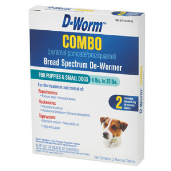Roundworms, otherwise known as ascarids, are the most common worm parasite to infect dogs. Of the various species, Toxocara canis and Toxascaris leonina most frequently cause problems for dogs.
Roundworms grow up to 7 inches long in the intestines, and females effectively propagate the species by laying up to 200,000 eggs in a day. Often roundworms do not cause symptoms in adult dogs, but they can cause malnutrition, diarrhea, vomiting, or a swollen stomach; sizable infestations can cause pneumonia or intestinal obstructions, as well as death in puppies. Puppies may also fail to thrive or have lusterless coats.
"Treating roundworm infections in dogs promptly will minimize symptoms and prevent complications."
Transmission and Diagnosis of Roundworms

There are three primary ways dogs get roundworms. The parasites may be passed to puppies from the mother during pregnancy if larvae migrate through the placenta or following birth via the mother's milk. Dogs can also ingest roundworm eggs in contaminated feces or soil or get ascarids by consuming infected animals, such as rabbits or other small rodents.
If a roundworm infection is suspected, your veterinarian will take a blood and stool sample to test. Dogs with roundworm infections often present with anemia, abnormal liver enzymes, and/or unusual numbers of circulating white blood cells.
A fecal flotation test is one of the most accurate and simple methods of testing for roundworms. This test involves mixing your dog's feces with a solution that enables the eggs and cysts of parasites to float to its surface. After mixing, the solution is strained into a test tube, mixed in a centrifuge, and then allowed to rest. Once the test is complete, any eggs that have floated to the surface are examined to determine their species.
Treating Roundworm Infections in Dogs
Worming medications are the treatment for ascarids. Sentinel, D-Worm, and Heartgard Plus are effective products that also help control other internal parasites. These products paralyze roundworms or otherwise render them unable to adhere to the intestines. Following administration, the parasites are readily expelled from the gastrointestinal tract via bowel movements.
Preventing Roundworm Infections in Dogs
Preventing roundworms is always preferable to treating an infection once it occurs. Follow a regular worming schedule established by your veterinarian, and quickly remove and dispose of feces after your dog has a bowel movement. This also helps prevent the spread of roundworms to human children and adults who play or work in the yard. Take appropriate steps to curb coprophagia in your dog, and monitor him to stop him from eating small animals. If you are boarding your pet, confirm that the kennel you choose implements a standard parasite prevention program.
If you notice any symptoms of roundworms in your dog or see blood or earthworm-like or spaghetti-like strands in your dog's feces or vomit, bring your dog and a fresh stool sample with you to your veterinarian. Treating roundworm infections promptly will minimize symptoms and prevent complications.
References
http://pets.webmd.com/dogs/roundworms-dogs
The above is provided for information purposes only and should not be used for the diagnosis or treatment of any condition.
This information does not cover all possible variables, conditions, reactions, or risks relating to any topic, medication, or product and should not
be considered complete. Certain products or medications may have risks and you should always consult your local veterinarian concerning the treatment of
your pet. Any trademarks are the property of their respective owners.